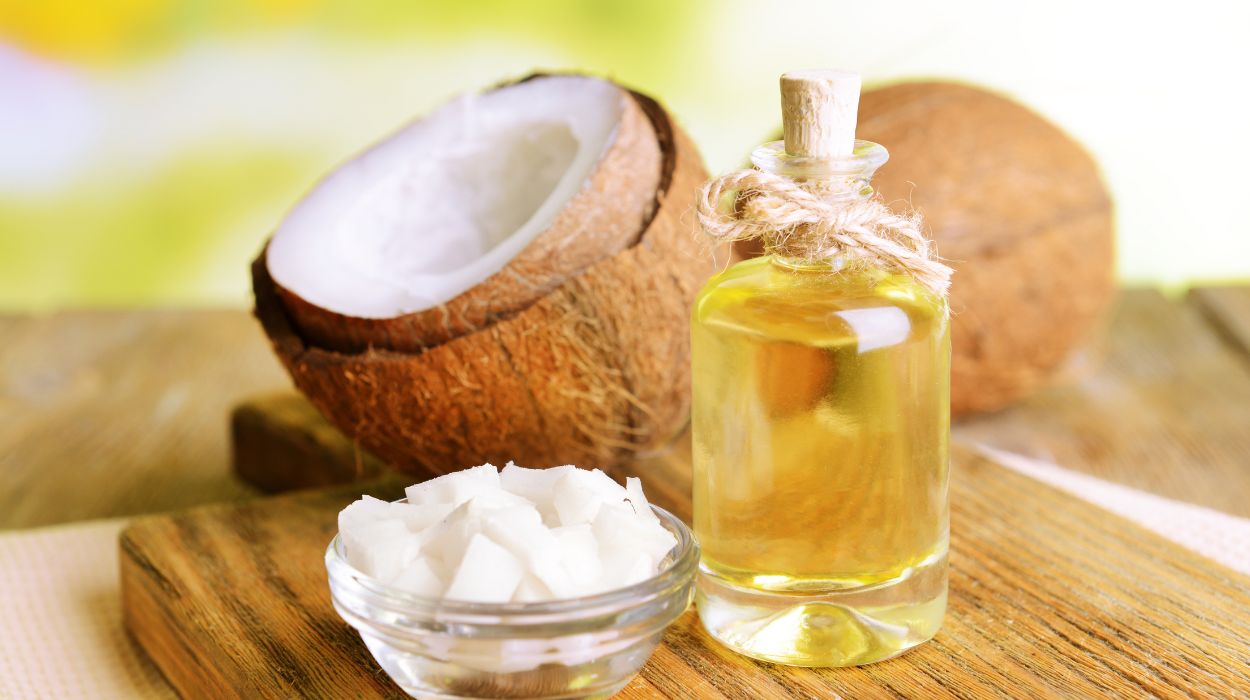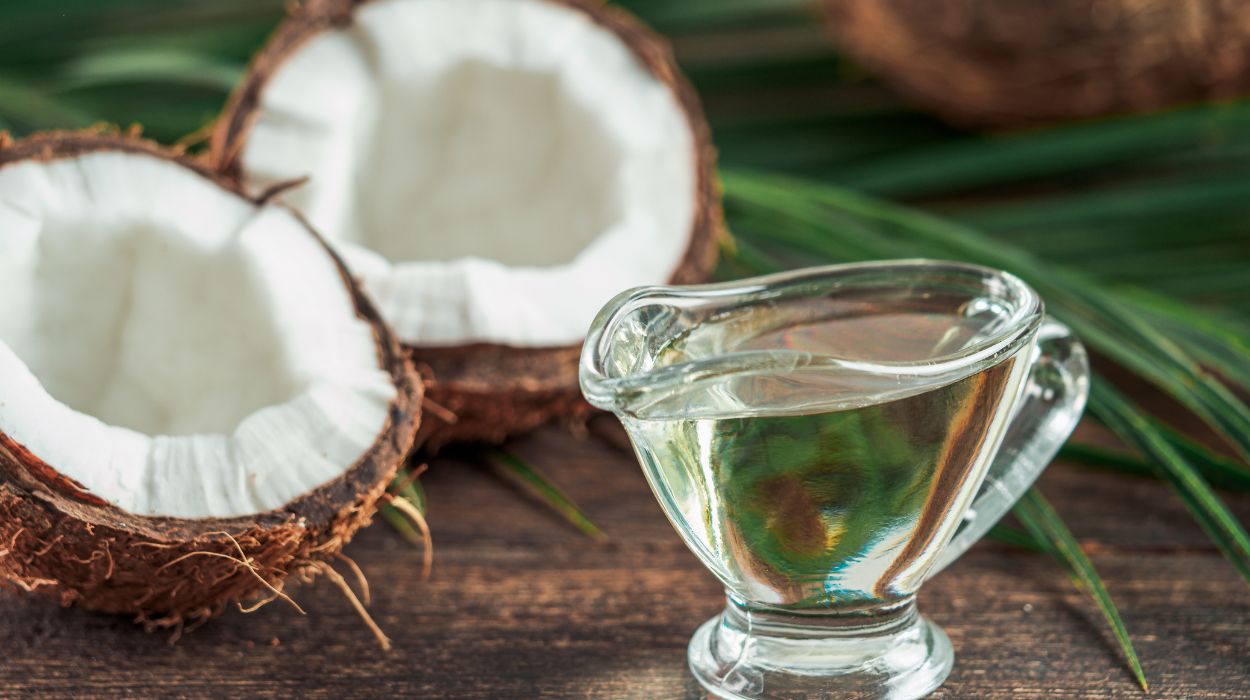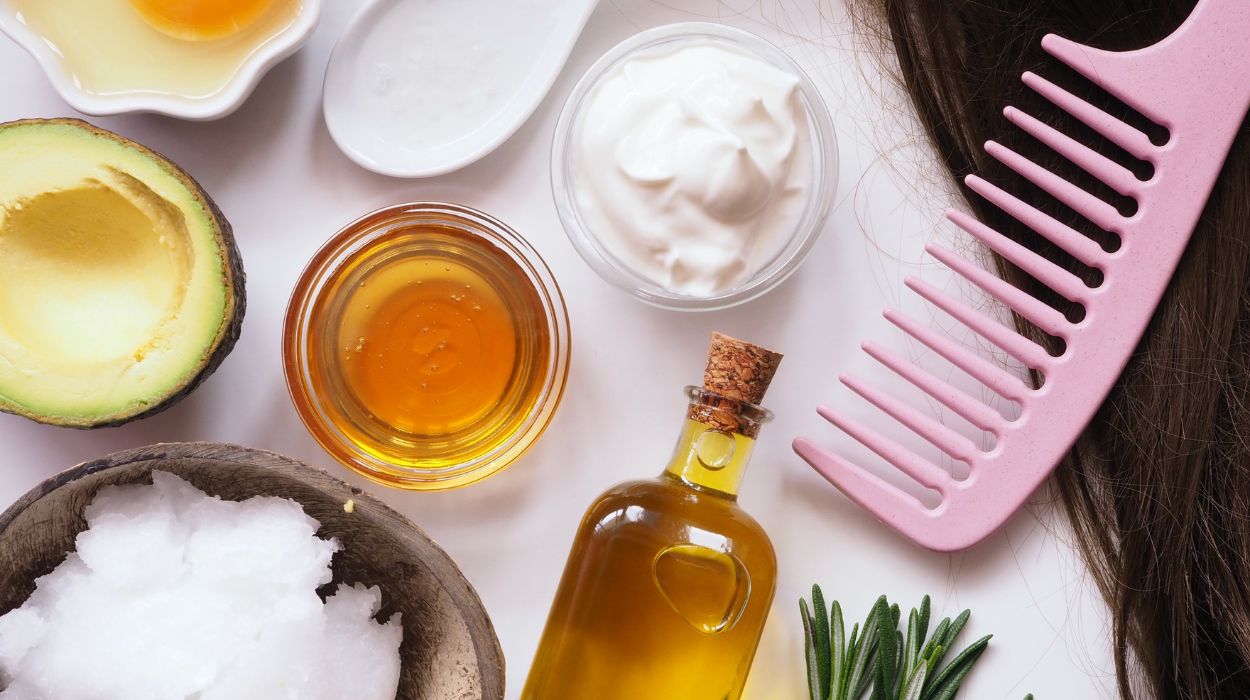 Expert's opinion
Expert's opinion
Expert's opinion
The article is a subjective view on this topic written by writers specializing in medical writing.
It may reflect on a personal journey surrounding struggles with an illness or medical condition, involve product comparisons, diet considerations, or other health-related opinions.
Although the view is entirely that of the writer, it is based on academic experiences and scientific research they have conducted; it is fact-checked by a team of degreed medical experts, and validated by sources attached to the article.
The numbers in parenthesis (1,2,3) will take you to clickable links to related scientific papers.
Coconut Oil For Gut Health: 5 Benefits For Your Digestion 2024

Living with health problems related to a leaky gut doesn’t have to persist. Coconut oil has proven good for gut health and is a helpful solution to digestive issues and complications due to a leaky gut. Try adding coconut oil to your diet in creative and flavorful recipes, or take it as a supplement to reap the benefits. Maintaining a healthy microbiome and supporting a balanced digestive system is crucial to healing a leaky gut and enjoying optimal health.
Coconut Oil For Digestion: 5 Health Benefits
- Contains antibacterial, parasitic, and fungal properties that help to cure digestive issues.
- Promotes the growth of some beneficial bacteria in the stomach.
- Helps to lessen bloating and IBS symptoms.
- Aids the body’s absorption of minerals and vitamins.
- Helps lose body fat, build weight in the stomach, and avoid health concerns.
5 Coconut Oil Benefits That Can Heal Leaky Gut

Genetics, diet, and lifestyle choices may lead to the development of a leaky gut and related problems. Crohn’s disease, Celiac disease, IBS, and food allergies all have connections to digestive issues and an out-of-control gut microbiome. However, coconut oil can slowly heal and restore a troubled intestinal tract. Consider the following ways coconut oil has a positive impact on gut health.
Featured Partner

Low-Calorie
Non-GMO
Vegan-friendly
Get Blown Away By Expert-Crafted Formula
Learn More About Colon Broom – one of the quality supplements promoting regular bowel movements, alleviates bloating, and supports healthy cholesterol levels.
Treats Bacteria, Parasites, And Fungi That Cause Digestive Disorders
A poor diet, chronic stress, or persistent disease can increase bacteria, fungi, and parasites taking over the digestive tract. MCTs and Laurides in coconut oil help dispel these problems and restore balance to the gut microbiome.
Increase Levels Of Healthy Gut Bacteria
It is vital to maintain a level of healthy bacteria in the gut, which is one reason eating foods that include vitamins, nutrients, or probiotics is beneficial. Taking coconut oil helps increase certain bacteria[1] that keep the gut microbiome in check. A healthy, balanced gut reduces stress, constipation, diarrhea, bloating, and painful gas.
Reduce Bloating And IBS’s Symptoms
IBS is a significant source of discomfort and embarrassment for many adults. However, taking coconut oil supplements or adding coconut oil to your diet can change that. Reduce bloating, excess flatulence, cramping, and diarrhea related to complications of IBS with coconut oil.
Improve Nutrients And Vitamins Absorb Ability
When the body cannot absorb sufficient vitamins and nutrients correctly, the gut microbiome and other bodily functions are out of sorts. Coconut oil has restorative properties to digestive health because it improves the body’s ability to absorb vitamins and nutrients.[2]
Reduce Body Fat, Gut-related Weight Gain
Signs of a leaky gut include persistent skin rashes, acne, aches and pains, bloating, and digestive problems. When the gut microbiome is imbalanced, it is easier to hold onto excess weight, have difficulty reducing fat levels, and related health problems caused by obesity. Add coconut oil to help treat a leaky gut and bring the body back into balance.
How Does Coconut Oil Support Gut Health?
The gut microbiome is considered the third brain of the body. After years of consuming a diet of unhealthy fatty foods, lacking vitamins and nutrients, and being starved of probiotics, digestive problems shortly follow. The symptoms of a leaky gut include, but are not limited to, suffering bouts of diarrhea, brain fog, joint pain, food allergies, excess weight, bloating, and skin problems.
A leaky gut occurs when bacteria find their way into the bloodstream, triggering the immune system into overdrive and creating inflammation. Since coconut oil has anti-inflammatory, anti-virucidal, and antifungal properties, it can help temper the body’s adverse reactions to toxins, parasites, and other unwanted elements.
Coconut oil contains Medium Chain Triglycerides that have antifungal, anti-virucidal, and anti-microbial properties. The MCT found in coconut oil and other sources on a healthy food list is easy to digest and may help restore the balance of gut bacteria. A poor diet can trigger increased symptoms of Irritable Bowel Syndrome, a proliferation of harmful bacteria, and an imbalanced gut microbiome. Various elements within coconut oil may help heal leaky gut and support overall healthy body function.
More About Coconut Oil
Since ancient times, coconut oil has been a part of homeopathic medicine, skin and beauty care, and culinary traditions. Having rich, thick, fresh coconut meat and a distinct flavor, it can be used internally or externally. Due to the nature of coconut oil, it has enjoyed popularity in the public eye as a superfood that contributes to glowing skin and hair, weight loss, and managing symptoms of various diseases.
Coconut oil contains MCTs, which have been studied to improve digestive health, lower blood sugar, promote weight loss,[3] and support heart health. Reap the benefits of coconut oil for healing a leaky gut and more by taking up to 10 mL of coconut oil 2 to 3 times a day for up to 12 weeks. You can add organic coconut oil to your food or take supplements.
How To Use Coconut Oil For Health?

Explore other health benefits of coconut oil[4] beyond improving and balancing gut health and healing a leaky gut. You can easily make coconut oil part of your diet and lifestyle by doing the following.
- Take a daily supplement.
- Consume cold-pressed coconut oil raw.
- Use processed coconut oil in dishes, saute vegetables or meat, add to smoothies, or in baking.
- Apply coconut oil to the skin and hair.
Look for extra virgin cold-pressed coconut oil in the form of supplements or jars for external or internal use. Refined coconut oil may be helpful for cooking and has a higher smoke point. However, it is better to consume extra virgin coconut oil that has fewer trans-fatty acids and contains more MCTs for your health.
Eating coconut oil shows promise in treating many persistent diseases, such as ulcerative colitis, as found in a study using animals.[5] Maintaining a balanced diet, watching out for excess bad fats that raise bad cholesterol levels, and using coconut oil in moderation is essential.
Best Ways To Add Coconut Oil To Your Diet
Taking supplements or consuming a spoonful of coconut oil isn’t the only way to balance your gut biome and get healthy. Consider the following methods to enjoy coconut oil in your life.
- Use coconut oil to saute vegetables or meat.
- Replace butter with coconut oil to dress popcorn and other snacks.
- Bake with coconut oil.
- Add coconut oil to a smoothie.
Try to choose coconut oil that is cold-pressed and virgin for your consumption. Although coconut oil contains MCTs, most coconut oils retailed at grocery stores contain more lauric acid. Lauric acid is connected to increased LDL cholesterol and decreased HDL cholesterol levels. Compared to MCTs, lauric acid is metabolized more slowly by the body.
Precautions
Take caution before starting a new supplement or adding new foods to your diet. If you do not regularly consume coconut oil, start with a small amount and watch for adverse reactions. Allergic reactions to coconut oil include but are not limited to nausea, hives, diarrhea, vomiting, a rash, trouble breathing, or eczema.
Do consult your physician if you are already taking prescribed medications to lower blood pressure or cholesterol levels. Coconut oil may naturally reduce blood pressure and interfere with agents used to lower cholesterol.
Be mindful of how much saturated fat is in your diet, as coconut oil is an abundant source. Consuming too much-saturated fats is connected to an increased risk of heart disease, high cholesterol, and stroke. For best results, avoid an excess of coconut oil and take it for a short period.
+ 5 sources
Health Canal avoids using tertiary references. We have strict sourcing guidelines and rely on peer-reviewed studies, academic researches from medical associations and institutions. To ensure the accuracy of articles in Health Canal, you can read more about the editorial process here
- Dragana Mitić-Ćulafić, Sinisa Djurasevic, Todorovic, Z. and Biljana Nikolić (2019). Effect of virgin coconut oil on caecal microbiota composition in alloxan-induced diabetic rats. [online] ResearchGate. Available at: https://www.researchgate.net/publication/336532053_Effect_of_virgin_coconut_oil_on_caecal_microbiota_composition_in_alloxan-induced_diabetic_rats.
- Mingan Choct (2009). Managing gut health through nutrition. British Poultry Science, [online] 50(1), pp.9–15. doi:https://doi.org/10.1080/00071660802538632.
- Vogel, C.E., Crovesy, L., Eliane Lopes Rosado and Soares‐Mota, M. (2020). Effect of coconut oil on weight loss and metabolic parameters in men with obesity: a randomized controlled clinical trial. Food & Function, [online] 11(7), pp.6588–6594. doi:https://doi.org/10.1039/d0fo00872a.
- Gambhirsinh Sursinh Vala and Kapadiya, P.K. (2014). Medicinal Benefits of Coconut Oil (A Review paper). [online] ResearchGate. Available at: https://www.researchgate.net/publication/280574942_Medicinal_Benefits_of_Coconut_Oil_A_Review_paper?enrichId=rgreq-1123f64ea25327708856ececf3a4e2a9-XXX&enrichSource=Y292ZXJQYWdlOzI4MDU3NDk0MjtBUzoyNTcyMzM0MjIzODUxNTNAMTQzODM0MDYzNTE0OA%3D%3D&el=1_x_3&_esc=publicationCoverPdf.
- El, A., mahmoud, H., Nagib, R. and Fayza EL-Azaly (2021). Comparative Study Between Virgin Coconut Oil and Omeprazole Drug on Ulcerative Colitis in Experimental Rats. [online] ResearchGate. Available at: https://www.researchgate.net/publication/349985674_Comparative_Study_Between_Virgin_Coconut_Oil_and_Omeprazole_Drug_on_Ulcerative_Colitis_in_Experimental_Rats.



